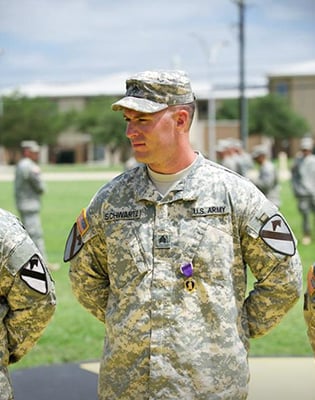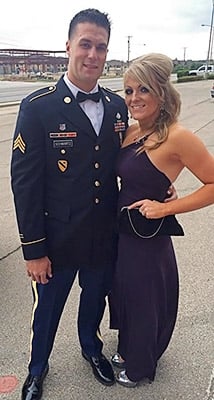The enemy was relentless. In the Middle East in 2013, the Taliban fired weapons with bullets that could pierce the armored vehicles carrying Sgt. Billy Schwartz (aka “Doc”) and his fellow soldiers. The terrorists packed their vehicles with explosives and drove them at Schwartz’s US Army convoy. Tours of duty between Iraq and Afghanistan can make it challenging for soldiers’ transitioning from military to civilian life.
As an Army senior combat medic, Schwartz knew deploying to Afghanistan (near the Pakistan border), the odds were one in three wouldn’t make it home. He survived.
Awarded a Purple Heart
In one engagement with the Taliban, Schwartz recalls a situation where a child got caught in the crossfire of war, was hit by shrapnel, and suffered severe trauma. He tied on a tourniquet to stop the bleeding and thankfully saved the child’s life.
This and other instances he provided emergency medical care under enemy contact, earned Schwartz a Combat Medical Badge. He was also awarded a Purple Heart after his vehicle was hit by an improvised explosive device (IED), and he sustained injuries as a result of enemy contact.

Sgt. Billy Schwartz (aka “Doc”) receives the Purple Heart |
Once Schwartz completed his time in service with the Army, he went back to his hometown of Colorado. Schwartz knew he wanted to pursue a medical career as a civilian. He accepted a position as a paramedic in Denver, responding to emergencies via ambulance.
“When it came to life saving measures, I have to remove my emotions and focus on the tasks at hand. It’s not about my feelings, it’s about your life. It's a mindset that has benefited me and will really aid me in acute care,” says Schwartz, bachelor of science in nursing candidate at the University of Colorado College of Nursing at the Anschutz Medical Campus.
“I learned one of my greatest qualities is my ability to communicate and de-escalate situations,” he says. “As a paramedic, I had the ability to always remain calm, focused and personable in very stressful situations. This helped ease panicked patients and families, allowing them to feel well taken care of in a time of distress.”
While he loved being a paramedic, Schwartz was ready to make even more of an impact.
“I realized how much I loved being the first emergency response person that people in crisis relied on. I made powerful connections in 15-minute intervals on the way to the hospital. However, I wasn’t satisfied just wondering and not knowing what patients’ outcomes were. I want to be involved with the complete continuum of care from their scariest moments to their recovery,” Schwartz says.
“When someone is sick or injured, I want to understand the underlying processes happening in the body, turn every stone, thoroughly assess the situation. I want to use that information to continue to polish my skills, progress as a nurse and be that much better for the next patient I care for,” he says. – Billy Schwartz, CU Nursing BSN student
Pivoting to Nursing
After realizing he was called to nursing, Schwartz earned his bachelor of science in biology degree from the University of Colorado Denver. In 2021, Schwartz enrolled in the Traditional Bachelor of Science in Nursing (BSN) program at CU Nursing on the Anschutz Medical Campus.
“When someone is sick or injured, I want to understand the underlying processes happening in the body, turn every stone, thoroughly assess the situation. I want to use that information to continue to polish my skills, progress as a nurse and be that much better for the next patient I care for,” he says.

Sgt. Billy Schwartz and his wife at the Military Ball |
“I also want to bring a new perspective to the nursing community—mastering my area of expertise, being the pioneer in advancing treatment and patient care options. Ensuring all patients feel informed, supported, and treated like family. I aspire to be the kind of nurse that I would trust with my own family.”
Schwartz’s combat experience helped him better manage mental trauma, like fear, while rapidly responding in life-or-death emergency situations. He understands the fear patients feel in hospitals and one of his goals is to reassure them.
“Part of the fear of being in a hospital is that there’s something wrong with you. The other part is the fear of the unknown. You don't know what's going on or what to expect, so you have a certain level of anxiety. As a nurse, you can alleviate that. Reducing fear is half the battle in recovery.”
Married with two children, the 37-year-old will graduate in May 2023. He hopes to work in an intensive care unit (ICU) or the emergency department (ED) after passing the national licensure examination (NCLEX). Long term, Schwartz plans on returning to CU Nursing to earn a doctor of nursing practice degree.



